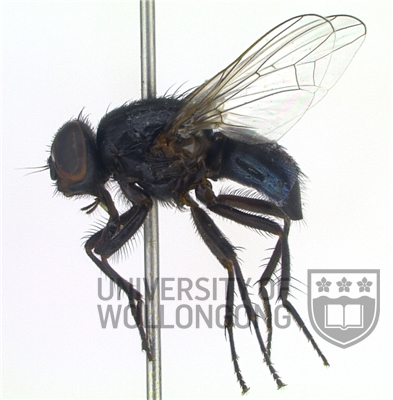Taxonomy
Family: Muscidae
Subfamily: Muscinae
Genus: Australophyra Malloch 1923
Species: rostrata (Robineau-Desvoidy 1830)
The first- and second-instar larvae were described by O'Flynn & Moorhouse (1980).
Biology
Commonly known as the black carrion fly, this fly is commonly observed around carcasses, particularly during the advanced stages of decomposition (Fuller, 1934). Its seasonality in Canberra was documented by Fuller (1934). She found that it is common year round, but most abundant from October to December, perhaps hibernating during Autumn. As a tertiary carrion fly, it generally infests carcasses at a late stage of decomposition when they are desiccated. The larvae, which may be predacious on other maggots, are rarely observed in carrion while primary invaders, such as calliphorids, are still present (Fuller, 1934). Australophyra rostrata has a minor role as a tertiary sheep fly.
Larval development of this fly has been investigated by Dadour et al. (2001) and O'Flynn (1983).
Distribution
This fly is very common in Australia. It has been recorded in all states, however, is most abundant in southern Australia, and relatively rare in the tropical northern areas.
Relevant Literature
Dadour, I.R., Cook, D.F. and Wirth, N. (2001) Rate of
development of Hydrotaea
rostrata under summer and winter (cyclic and
constant) temperature regimes. Medical and
Veterinary Entomology 15, 177-182.
Fuller, M.E. (1934) The insect inhabitants of carrion:
a study in animal ecology. Council for Scientific and Industrial Research,
Australia, Bulletin 82,
1-63.
O'Flynn, M.A. (1983) The succession and rate of
development of blowflies in southern Queensland and the
application of these data to forensic entomology. Journal of the
Australian Entomological Society 22, 137-148.
O'Flynn, M.A. and
Moorhouse, D.E. (1980) Identification of early immature
stages of some common Queensland carrion flies. Journal of the
Australian Entomological Society 19, 53-61.
Pont, A.C. (1973) Studies on Australian Muscidae (Diptera): IV. A revision of the subfamilies Muscinae and Stomoxyinae. Australian Journal of Zoology Supplementary Series 21, 129-296.





